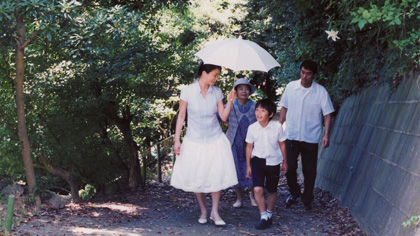Primary navigation


Trevor Johnston is wowed by a supremely subtle portrayal of the tensions within a Japanese family that puts director Kore-eda Hirokazu in the same league as his country’s masters of domestic drama, Ozu and Naruse
In Japanese, there’s more than one mode of greeting someone as you enter their house during the day. There’s “konnichiwa”, for example, a generalised, polite “good afternoon”; or “tadaima”, which says “I’m home”, and is the province of returning family members. It’s an indication of the small but telling details manifest in this gently probing domestic drama that visiting son Ryota utters the former when he arrives at his elderly parents’ place for a tense family gathering to mark the 15th anniversary of his brother Junpei’s tragic drowning. The distinction is understandably too tricky for the subtitles to register, but while writer-director Kore-eda Hirokazu’s offering is firmly in the culturally specific ‘home drama’ mode of Japanese cinema (where greats such as Ozu and Naruse plied their trade), his superficially gentle, utterly affecting film is by no means inaccessible to western viewers. Families not getting on is an international language, after all.
That said, it’s the way Kore-eda tackles universal emotional issues with a certain Japanese sensibility that has enabled his work to garner international critical mass and touch audiences beyond the festival circuit. Kore-eda has returned time and again to examine how and why we carry on with our lives in the shadow of loss: the widow starting afresh in Maborosi (1995); the speculative limbo of memories in Afterlife (1998); the families torn asunder by an Aum-style cult in Distance (2001); even the virtual bereavement of Tokyo kids abandoned by their mother in the Cannes prizewinner Nobody Knows (2003). Of course, he has also stepped outside this area with the light-hearted samurai tale Hana (2006) and this year’s Air Doll (in which an inflatable playmate acquires a life of her own). But it’s with the earlier films that the former documentarist has marked out a distinct subject-matter and visual approach – in which stylistic reserve painstakingly builds emotional potency – to cement his position at the forefront of his generation of Japanese film-makers.
Still Walking certainly enhances that reputation. Prompted by Kore-eda’s feelings of filial inadequacy and regret after his own mother’s death, the story is, in a sense, an attempt to recapture lost time by reconstructing a family day together. Knowing these circumstances, his honesty here is both bracing and poignant; this is no golden-hued memoir, but a recognition that bristling personal agendas so often mask underlying familial affections – until it’s too late to turn things around. Eased along by summer sun and gentle guitar strumming on the soundtrack, the film’s eddying domestic travails spring from an authentic sense that simmering tensions are as much about what remains unspoken as they are about the actual injuries we cause one another.
Even in subtitled form, this is a dialogue masterclass. Sly comments and pointed asides take precedence over upfront speechifying, while revelations are subtly layered in without narrative strategies becoming unduly obvious. Certainly, the Yokoyama clan have a whole array of resentments on their minds, what with the ageing parents dwelling on the loss of the father’s favourite son, while struggling art restorer Ryota (the audience’s entry point and presumably a correlate for Kore-eda himself, given the film’s broadly autobiographical basis) feels left out in the cold. Ryota’s parents aren’t pleased with his marriage to a widow with a small son, while their own relationship seems irredeemably curdled by the patriarch’s past infidelities. In one piercing sequence, when Ryota’s mum prevails on him to put on a record of a keening late-1960s pop ditty, ‘Blue Light, Yokohama’, we presume we’re in for a romantic madeleine, yet her intent is to mark her own sufferings in the intervening decades.
As 24 hours unfold, there’s an insidious suspense in waiting for it all to blow. Ryota clearly wants recognition from his parents that they were cruel to make him feel the wrong son died, yet they continue to snipe at him from behind hardened attitudes and implacable routine. Gangling Abe Hiroshi’s performance as the exasperated son is by no means showy, but he deftly depicts someone seeking a balance between peace-keeping acquiescence and the maintenance of his own self-respect. Harada Yoshio, as the father, is a rather more stolid performer (known in his younger days for hard-boiled yakuza roles), but his style works well for the role, while Kiki Kirin’s adept portrayal of the mother manages to be at once bustlingly homely yet truly cutting in her passive-aggressive demeanour.
As the key location, the Yokoyamas’ house is virtually a character in itself, its traditional layout underlining the old folks’ conservatism, as well as taking us back to the interior landscapes of Ozu and Naruse (possibly more so for western viewers than for the Japanese themselves). Kore-eda’s handling is attuned to an implicit demarcation between the house’s public and private spaces, especially in the way the father, a retired doctor, guards his old office as if desperately clinging to any vestigial authority it still conveys. Although there’s always a sense of affection present beneath the fractious surface, and there are brief glimpses of happier times when the baby photos come out and the mother cooks her special sweetcorn fritters, the abiding impression is that amid so many unresolved grievances, the most obvious bond between the divided clan is having to persevere in the shadow of death.
In addition to the departed Junpei’s annual memorial service (where the hapless stranger he died saving is invited along just so the parents can see him squirm in shame at being alive), this tragic shadow is also manifest in the assiduous washing of Junpei’s gravestone. Meanwhile, the elderly mother finds some comfort in regaling everyone with an old wives’ tale that the yellow butterflies at the cemetery are actually white ones that have changed colour to cheat mortality and face another summer. This points to a key moment later in the film, when Ryota – who was so disdainful of his mother’s yellow-butterfly story when she told it – repeats it to his own children, in an attempt to salve his sense of loss.
In line with the somewhat secular, almost businesslike heaven in Afterlife and the fairly astringent chronicle of the neglected children in Nobody Knows, there’s not much in the way of spiritual succour here. The original Japanese title, Aruitemo, Aruitemo – a refrain from the song ‘Blue Light, Yokohama’ – literally means ‘Walking, Walking’, in the sense of trudging along but never really getting anywhere. All of which makes one wonder whether the film is really as close in kinship to Ozu as its complementary programming alongside the eagerly anticipated Ozu retrospective at BFI Southbank might suggest. Yes, Kore-eda captures mealtime conversations in a fairly traditional Japanese residence, and yes, he cuts to shots of trains passing by to give the viewer time to reflect. However, while Ozu created something sublime from the melancholy acceptance of life’s disappointments, Kore-eda’s sensibility here is surely far closer to Naruse, where so often the anguish – of a life bounded by real-world financial difficulties and the chastening wilfulness of others – is much sharper, and not always borne with such grace.
Kore-eda leaves us with a long-held image of commuter trains trundling by in the middle distance, a moment whose metaphoric intent is clear, yet which somehow also eschews transcendent uplift – those trains have people on them with the same problems as the rest of us. In the end, though, however one positions Still Walking in the firmament of Japan’s cinematic achievements, one thing is sure: it belongs up there with the masters.
Afterlife reviewed by Tony Rayns (October 1999)